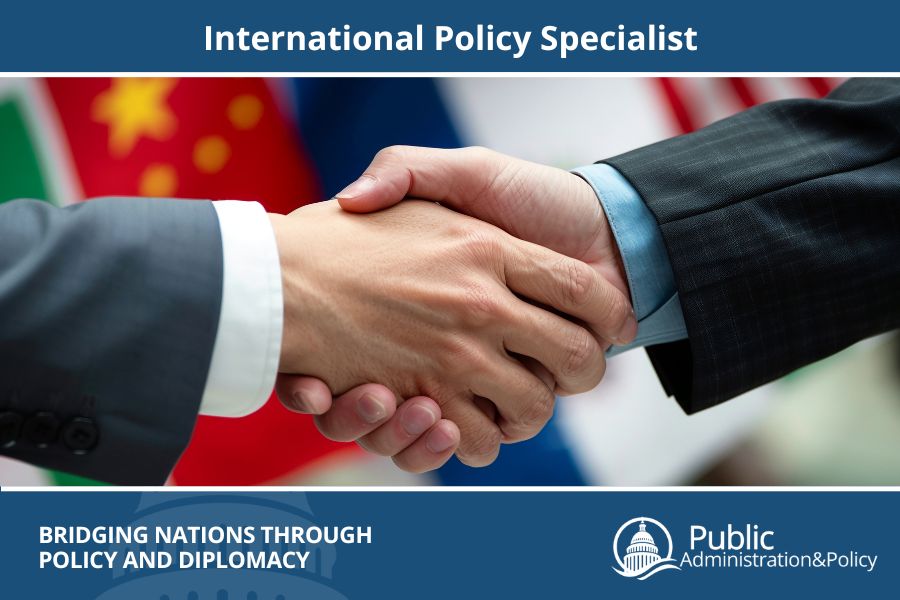How to Become an International Policy Specialist
Build Bridges Across Nations and Shape Global Policy for Meaningful Change
International Policy Specialists are key players in addressing complex global challenges and fostering collaboration between nations. These professionals work to create and influence policies that tackle critical issues such as diplomacy, trade, human rights, environmental sustainability, and international development. Analyzing global trends, negotiating agreements, and crafting strategic solutions help build a more interconnected and equitable world.
In their roles, International Policy Specialists engage with a wide range of stakeholders, including governments, international organizations, NGOs, and private entities. They navigate the complexities of geopolitics, cultural diversity, and economic disparities to promote cooperation and shared solutions. Whether resolving conflicts, supporting humanitarian efforts, or driving sustainable development initiatives, their contributions are instrumental in shaping a better future on a global scale.

Table of Contents
What Is an International Policy Specialist?
An International Policy Specialist researches, develops, and advocates for policies that address global issues. They focus on foreign policy and international relations and work to promote peace, economic development, and environmental sustainability on a global scale.
Key Job Duties
- Policy Analysis: Evaluate foreign policy and international trends to recommend actionable solutions.
- Diplomacy and Negotiation: Represent organizations in negotiations with foreign governments and international stakeholders.
- Program Development: Develop and implement initiatives addressing international law, trade, and global health.
- Advocacy and Communication: Present research findings to policymakers, NGOs, and the public.
- Collaboration: Work with foreign service officers, national security experts, and global partners.
International Policy Specialists often work in government agencies, think tanks, nonprofit organizations, and multinational corporations. Similar roles, such as global affairs specialists, contribute to advancing international cooperation and security.
“We may have different religions, different languages, different colored skin, but we all belong to one human race.”
— Kofi Annan, Former United Nations Secretary-General
Earning a degree in international relations, public policy, or global studies is essential for pursuing a career in international affairs. These programs provide the foundation for understanding diplomacy, international law, and foreign policy.
Best Degrees for International Policy Specialists
- Bachelor of International Relations: Covers global governance, foreign policy, and economic systems.
- Bachelor of Public Policy: Focuses on public affairs and policy analysis.
- Master of International Affairs (MIA): Offers advanced training in foreign policy and international development.
- Law School: Specializing in international law provides a pathway to legal advisory roles in global affairs.
Why Online Programs Are Beneficial
Online degree programs in public policy and international relations offer flexibility for working professionals. Many universities in the United States provide online MIA and MPP programs tailored for students balancing education with careers.
Explore Degree Options:
- Master of International Affairs (MIA) Programs
- Master of Public Policy (MPP) Programs
Step 2: Learn About International Policy Specialist Salaries
Salaries for International Policy Specialists vary based on education, location, and employer type. According to the Bureau of Labor Statistics (BLS), careers in international affairs offer competitive pay, with roles in Washington, D.C., often commanding higher salaries.
Salary Range by Experience
- Entry-Level Specialists: $50,000–$70,000 annually.
- Mid-Career Specialists: $80,000–$100,000 annually.
- Senior Specialists or Directors: $110,000+ annually.
Factors Influencing Salary
- Education Level: Advanced degrees, such as an MIA or law school specialization in international law, often lead to higher salaries.
- Specialization: Areas like national security and international development are in high demand.
- Employer Type: Federal government agencies and private sector organizations typically offer higher salaries than nonprofit organizations.
Visit the Bureau of Labor Statistics (BLS) for insight into job outlook and salary trends.
Step 3: Build Analytical and Communication Skills
International Policy Specialists need analytical expertise, foreign language proficiency, and communication skills to excel in this field.
Key Skills for International Policy Specialists
- Research and Analysis: Interpret global trends and assess policy impacts.
- Foreign Language Proficiency: Fluency in languages like French, Spanish, or Mandarin enhances career prospects.
- Diplomatic Communication: Collaborate with foreign affairs experts and stakeholders.
- Strategic Thinking: Develop innovative strategies for international policy challenges.
- Legal Knowledge: Understanding international law is crucial for advising on global regulations.
Certifications to Enhance Your Career
- Certified Global Business Professional (CGBP): A recognized credential for international trade and global affairs expertise.
- Conflict Resolution Certification: Demonstrates skills in mediation and negotiation.
Workshops offered by organizations like the Council on Foreign Relations (CFR) and professional language courses can help refine your expertise.
Step 4: Find an International Policy Specialist Job
International Policy Specialist jobs are available across various industries, providing opportunities to address global challenges and promote international collaboration.
Industries That Hire International Policy Specialists
- Government Agencies: Lead foreign policy initiatives and develop international agreements.
- Nonprofit Organizations: Focus on humanitarian aid, international development, and environmental advocacy.
- Private Sector: Advise multinational corporations on international business strategies.
- Think Tanks: Conduct research and shape policy recommendations on global issues.
Notable Employers
Search for global affairs specialist jobs on platforms like Idealist and LinkedIn to find opportunities in the United States and abroad.
Career Opportunities in International Policy
A career in international policy offers diverse growth opportunities. Popular roles include:
- Foreign Service Officer: Represent your country in diplomatic relations.
- International Development Specialist: Focus on advancing global health and education initiatives.
- Trade Policy Advisor: Analyze and negotiate international trade agreements.
- Human Rights Advocate: Address global social justice issues.
- Environmental Policy Analyst: Develop sustainable strategies to address global environmental challenges.
Organizations like the World Economic Forum and Amnesty International provide resources for advancing your career in international policy.
Sources
- Bureau of Labor Statistics (BLS). “Political Scientists.” https://www.bls.gov
- Council on Foreign Relations (CFR). “Careers in International Relations.” https://www.cfr.org
- United Nations (UN). “Careers in Diplomacy and International Policy.” https://www.un.org
- Payscale. “International Policy Specialist Salary Overview.” https://www.payscale.com
Acknowledgments
This content draws from insights provided by government agencies, international organizations, and academic experts. Special thanks to Kofi Annan for his dedication to fostering international peace and collaboration.
